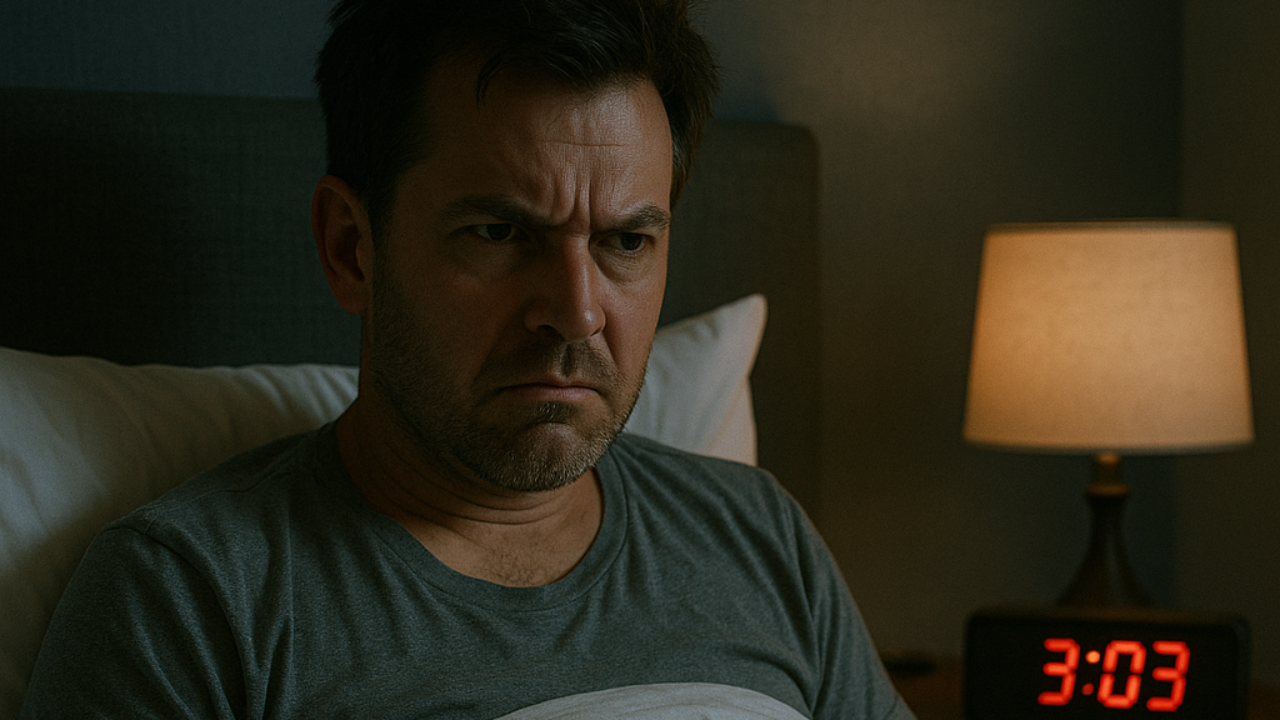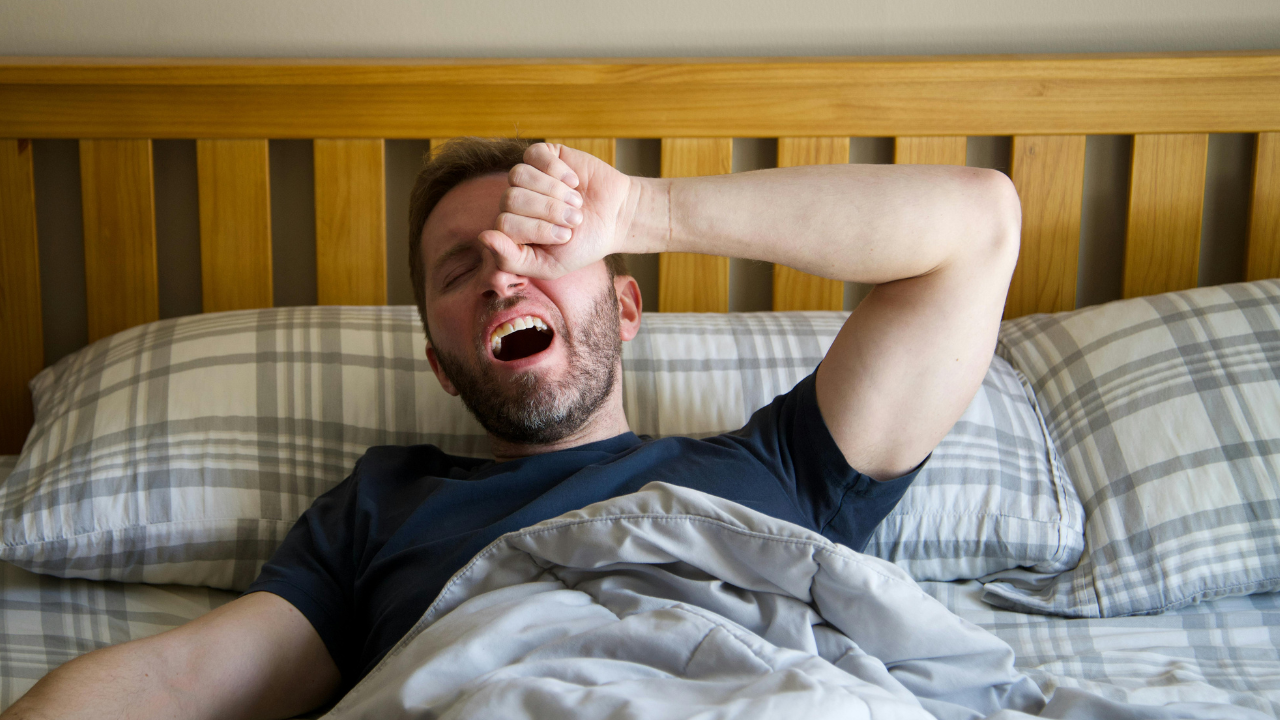How to Put an End to Middle-of-the-Night Wake-Ups
May 20, 2025
It’s my 34th birthday today. Well, technically it was yesterday, as you’re reading this on the 20th, but who cares about technicalities 😂
I've made another successful trip around the sun.
I drank some nice wine, ate delicious steak, and explored a new city, all with my fiancée.
Birthday weekends don’t get much better.
I was going to share some birthday wisdom, but I’ve already done that on LinkedIn. You can check that post out here.
Instead, I’m going to dish out one of my most helpful emails yet.
Let’s get stuck in…
In my nearly decade of coaching, the issue of waking up during the night has been one of the more common complaints I get from clients.
As far as issues go, it’s certainly one of the most frustrating ones.
Besides the annoyance it brings, there's also the very real negative impact that it has on your health through:
- Loss of overall sleep
- Less restorative sleep
Both of which can lead to:
- Brain fog
- Less energy
- Insulin resistance
- Higher fat storage
- Weaker training performance
Rather than living in hope that it’ll improve, which very rarely happens, you need to take a proactive approach.
Which is exactly what I help my clients do. And to nobody’s surprise, we fix the problem.
You might not currently have this issue, but you may in the future, or you might know somebody who’s struggling at the moment.
But before we get into HOW we fix the issue, I think it’s important that you first understand WHY the issue happens.
What Might Be Causing You to Wake Up in the Night?
Understanding why you’re waking up is the first step in fixing it. Here are some of the most common (and overlooked) culprits:
Blood Sugar Drops
When you eat your last meal too early or skip slow-digesting carbs and protein, your blood sugar can crash in the middle of the night.
In response, your body releases stress hormones like cortisol to bring your blood sugar back up.
This hormonal spike is enough to jolt you awake, sometimes with a racing heart or some anxious thoughts to boot. (1)
Stress and Mental Overload
Yes, you're physically in your bed, but mentally?
You're still in meetings or thinking about tomorrow’s to-do list. This sh*t ain't good for your brain or body.
High performers often carry their workload into the night without realising it.
Mental stimulation, emotional strain, or even just an overstimulating evening (TV, emails, scrolling) can keep cortisol elevated, which prevents your brain from sinking into deep, restorative sleep.
Are you starting to notice a cortisol trend?
Poor Sleep Environment
Even if you fall asleep fine, a crappy sleep environment can quickly pull you out of it.
Common offenders include:
- Light from windows or devices
- Noise (roads, pets, snoring)
- Being too warm in bed
These might sound minor, but they can easily fragment your sleep and cause you to get pulled out of the all-important deep sleep.
Circadian Rhythm Disruption
You've more than likely heard me speak about the importance of your body’s natural circadian rhythm numerous times before.
Your body loves rhythm and is governed by an internal clock that is approximately 24-25 hours in length, which controls hormone release, alertness, and has a big part to play in the sleep cycles.
When your sleep and wake times change drastically (especially on weekends), or when you travel across time zones, this internal clock goes out of sync.
It gets all beaten up and feels rather sorry for itself, which can cause difficulty both falling and staying asleep.
Menopause
As women approach menopause, hormonal fluctuations, particularly drops in oestrogen and progesterone, can significantly disrupt sleep.
- Night sweats and hot flashes can jolt the brain awake mid-sleep.
- Lower levels of progesterone reduce relaxation & may heighten irritability or anxiety.
- Research suggests that pre-menopausal women are protected against sleep apnea by hormones. After menopause, that protection fades, and women become just as likely as men to experience it, a condition that can cause an individual to wake up several times throughout the night.
Sleep quality also tends to decline, with less time spent in REM sleep, leading to poorer recovery and more morning fatigue. (2)
Well, isn't all of that a complete sh*t show 😂
Now that we're clear on the most common culprits, let’s get to work on fixing the issue.
First on the agenda...
Tips For Staying Asleep
Before we get into the tactics behind getting back to sleep once we've woken, how about we try and stay asleep first.
There are things that you can do to give yourself the best possible chance of staying in a deep, uninterrupted sleep.
Review Your Day and Look for Clues
Before you reach for supplements or new routines, zoom out.
Ask yourself:
- Did I eat enough today?
- Did I exercise too close to bedtime?
- Was I overstimulated with screens, emails, or intense conversations?
- Did I drink alcohol or caffeine later than usual?
Your day sets the stage for your night. A few simple tweaks is all that's usually needed, and keeping a diary of your day massively helps with that.
I suggest keeping a simple sleep log for a week. Patterns will usually emerge.
Improve the Depth of Your Sleep
If you’re spending too much time in light sleep, you’ll wake more easily. Light sleep isn’t restorative, rather it’s shallow, easily disrupted, and often leaves you feeling unrefreshed.
It's still an important sleep stage, but you shouldn’t be spending the majority of your time in this stage.
To learn how you can improve your deep sleep, watch the section in this video. It starts at 9:00 and covers how you can improve your sleep straight away.
Balance Your Evening Nutrition
Food timing and quality play a huge role in night-time stability. As we spoke about earlier, we want to avoid any nighttime blood sugar crashes.
To do that, a good rule of thumb to follow is:
- Don’t go to bed hungry — it can trigger a cortisol response
- Don’t go to bed stuffed — it disrupts digestion and core body temperature
- Stick to protein, fat, & 'good' carbs later in the day.
This small change alone can help prevent blood sugar dips that wake you up at 2 or 3am.
Use a Wind-Down Routine
Your body can’t just switch from high alert to deep rest in a few minutes, rather it needs a clear runway.
If you don't give yourself sufficient time and space, you're never going to land good sleep. I've got no idea why I'm using plane analogies here but I'm flying with it 😂
Here's a sample routine you can try 30–60 minutes before bed:
- Dim all lights
- Turn off screens (or use blue light filters)
- Read something non-stimulating
- Journal to offload thoughts
- Breathe slowly through your nose (e.g. box breathing, 4-7-8)
The goal is to tell your nervous system, “We’re safe. We can power down now.”
Create a Sleep-Friendly Environment
Your bedroom should be a sleep cave: cool, quiet, and dark.
I know for some of you animals out there, it's more of a sex dungeon, but it's first port of call should be a sleep haven.
A few things you can do include:
- Use blackout curtains or an eye mask
- Set the room temperature to 16–19°C
- Keep pets out if they move around at night
- Consider earplugs or white noise if sounds disturb you
- Remove or cover LED lights (even the tiny ones on chargers)
Make your room boring so your brain only associates it with sleep.
Support Your Circadian Rhythm
We need to have your body in sync with it's natural alarm clock, but this only happens if you let it.
Earlier I mentioned how erratic sleep and wake times, especially on weekends, confuse your rhythm and make it harder to stay asleep through the night. This is the first thing we're going to fix.
How to sync your internal clock:
- Wake up and go to bed at consistent times, even on weekends
- Get 10–20 minutes of sunlight within 30 minutes of waking up
- Limit light exposure at night, especially overhead lighting and screens
This is one of the most overlooked solutions, but easily one of the most powerful.
Avoid Alcohol
Alcohol may help you fall asleep faster, but it disrupts the quality of your sleep.
It suppresses REM sleep, increases restlessness, and can lead to dehydration and night-time wake-ups as your body metabolises it.
Even small amounts (a glass of wine with dinner) can have a noticeable effect, especially if you’re over 30 or under stress.
Now that I'm 34 and building a business, I can attest to this 😂
Right, now that you're clear on some of the things you can do to achieve a better nights sleep, it's now time to get clear on the steps we can take to get your ass back to sleep if you've been unfortunate enough to wake at 3 am.
First, let's get clear on What Not to Do If You Wake Up in the Night:
Never Check the Time
Looking at the clock creates an immediate mental calculation:
“If I fall asleep now, I’ll get 3 hours…”
We've all been there and it's horrible.
This fuels anxiety and reactivates your prefrontal cortex, the part of your brain responsible for problem-solving and planning, the exact opposite of what you want at 3am.
Dr. Matthew Walker (author of Why We Sleep) recommends keeping clocks out of sight for exactly this reason. The awareness of the time fuels a stress response that makes it harder to fall back asleep.
If know that you keep waking up at 3 am, that's your first problem.
This is hands down one of the most effective things you can do. Yes, it takes some practice, but it's a habit with tremendous impact.
Don’t Turn on Lights
Light exposure halts melatonin production and tells your brain it’s morning, even if it’s 2am.
If you must get up, use a red or dim amber light that won’t disrupt your circadian rhythm.
Try Not to Go to the Bathroom (Unless Necessary)
Getting up to pee can become a conditioned habit rather than a real need. If you’re waking to go every night, question:
- Are you drinking too much fluid before bed?
- Are you waking from poor sleep and then deciding to go?
Unless it’s urgent, stay in bed and refocus your attention inward. But if you really need to go, then go. I don't want to be getting any angry emails from you in the future 💦 😂
So avoid these at all costs, and instead, if you’re awake for more than a few minutes, here are the best ways to guide your body back into sleep:
Use 4-7-8 Breathing
A proven method to calm your nervous system:
- Inhale through the nose for 4 seconds
- Hold for 7 seconds
- Exhale slowly through the mouth for 8 seconds
- Repeat for 4–8 rounds.
This down-regulates stress, slows the heart rate, and reactivates your parasympathetic nervous system, your “rest and digest” mode.
Try a Mind-Focusing Technique
When your mind won’t stop racing, try gently anchoring your attention:
- Repeat a calming word in your head (e.g. “relax” or “safe”)
- Visualise a peaceful scene
- Slowly count backwards from 200 by 3.
These techniques reduce 'cognitive noise' without stimulating you further.
Use NSDR (Non-Sleep Deep Rest)
If sleep doesn’t return quickly, you can still reap the recovery benefits by entering a deep rest state.
Even though you may not be in a full sleep, research suggests that you can still benefit from restorative sleep simply by laying in a restful state.
Even if you don’t fall fully back asleep, this can help restore your nervous system, reduce cortisol, and can still leave you feeling refreshed.
Lying there for an hour and resting will still be doing you some good. Remember that.
There we have it. That's the framework that is hopefully going to solve the issue of nighttime wake ups once and for all.
I hope that was helpful.
My coaching program, The Paradigm Project, helps ambitious entrepreneurs, c-suites, & business owners live a healthier, stronger, and all-around better life.
Most importantly, one of the main aims of the program is to help every single client achieve pain-free performance!
If you are in the mood to transform your health & fitness, then life-changing results are within your reach.
Click on the link to book your free coaching call and we can build a plan that changes your life!
Quote for the day
“A good laugh and a long sleep are the two best cures for anything.”
– Irish Proverb
- Mark
P.S. Whenever you’re ready, here are a few ways I can help you:
- Are you an ambitious entrepreneur or professional who wants to get strong, lean, and boost your energy? Then find out more about my 1-1 coaching here.
- Grab a FREE copy of my Ultimate Health Guide by Clicking here now.
References
- Van Cauter, E., & Polonsky, K. S. (1999). Sleep, circadian rhythms, and insulin secretion. In Diabetes Reviews, 7(4), 275–288.
- https://www.yalemedicine.org/news/women-are-your-hormones-keeping-you-up-at-night
Disclaimer: This newsletter is for educational and informational purposes only. It is not intended to provide medical advice, diagnosis, or treatment. Any guidance related to training, nutrition, supplementation, or lifestyle is general in nature and not a substitute for personalised medical advice. Always consult with a qualified healthcare professional before making changes to your health routine.





